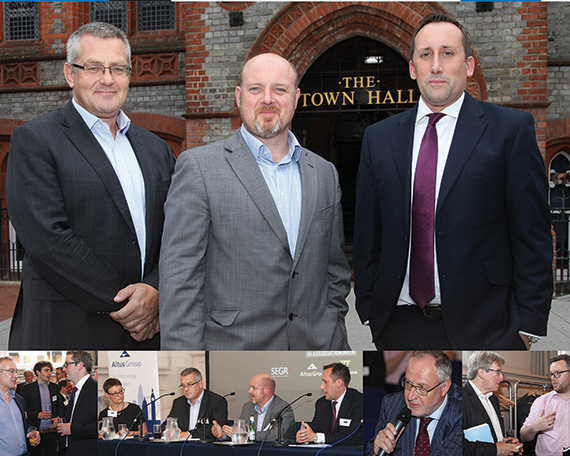In the first City Talks covering the region, the panel talks transport, office availability and development, in the fight to keep employment and development in the area
The arrival of Crossrail in 2019 and the prospect of an expanded Heathrow, should the Davies report recommendations be accepted in October, are great news for the Thames Valley. But there is work to be done to ensure the conurbation does not become simply an area to pass through or travel from.
Speaking at Estates Gazette’s first Thames Valley City Talks event in Reading town hall last month, Gareth Osborn, Thames Valley and national logistics director at SEGRO, expressed concern about a “brain drain” as Crossrail allows easier access to London.
He said: “We have to think of a solution. We had it good 15 or 20 years ago, with large corporates coming into the Thames Valley and taking more space, now there is a real threat. At SEGRO we used to employ people from all around here, but now 30% of our property team lives in London.
“The pull of the capital and places like Shoreditch is powerful, we have a noisy neighbour and we have to try to fight back against it.”
Reading and neighbouring Bracknell punch above their weight when it comes to digital jobs, according to the Tech Nation 2016 report. Reading and Bracknell’s turnover in digital businesses is £10bn, putting the conurbation ahead of Bristol, Bath, Manchester and Birmingham.
But the panellists agreed that more needed to be done to foster small and medium-sized tech companies.
“Getting infrastructure right in the Thames Valley in terms of connectivity is important,” said Osborn. “There have been times you would have to leave Winnersh to download a big file – that is a premier office park, so there are issues here. Connectivity across the region is not as good as it should be and if you got it right it would encourage these small industries to establish themselves here.”
All businesses, regardless of sector, need appropriate space. A big benefit of Crossrail is the number of development projects earmarked for Maidenhead and Slough, which are on the route of the new line.
“We are seeing how Crossrail has had a knock-on effect on other areas, but there is still lots of smaller stuff that needs to come through,” said Tim Burden, director at Turley.
While the need for housing was acknowledged, the balance may have tipped too far in its favour. Burden believes a lack of positive planning towards commercial space is a hindrance. Permitted development rights have not helped, with a lot of secondary office stock converted to residential.
Burden’s firm has first-hand experience of trying to find office space in the area. He said: “When Turley opened its office in Reading we found it a bit challenging to find offices of a decent size.”
Lack of suitable stock
Peter Freeman, senior director of Thames Valley business space at Altus Group, agreed that availability is a big issue but believes the challenges also lie in acquiring appropriate sites.
He said: “Permitted development rights have taken stock out of the office market, but a lot of that is arguably old stock which, if you wanted to retain as an office, would be cheaper to knock down and start again.
“Getting your hands on a site, whether for industrial or for offices, is the issue. Residential developers are paying so much for the sites and a lot of funds are now looking at their portfolios and asking what are they going to do with them. A speculative refurbishment would cost a lot, or they could sell now to residential buyers, get tenants out early and make good money.”
The lack of stock is pushing up rents, which is good for landlords but risks pricing out some businesses, leading to what Freeman called a real dilemma in the market.
Osborn added: “We should be thinking about industrial and affordable business space in planning considerations in the same way as affordable housing. As a developer, we need flexibility and to support the start-up sector, particularly in light of the brain drain into London.”
Speed of planning also needs to be addressed. Burden said: “The planning system is always under change and slow at times, which is frustrating for people who just want to get on and do business in the area – though that is a national issue not just a Thames Valley issue.”
Would a reassessment of existing sites and uses help? Osborn thought so. “From an industrial perspective, there is a lack of good-quality land but there is quite a lot of land the council is hanging on to for industrial applications which could be used better,” he said. “We could free up existing poor-quality industrial to build good-quality residential.”
Many of the challenges the Thames Valley faces are not dissimilar to elsewhere, but it also has many strengths to draw on. The debate concluded with a call to arms for the Thames Valley to do more to promote and market itself.
Construction skills gap
Construction company Willmott Dixon, which recently opened an office in Farnborough to expand its business further into the Thames Valley, said the biggest barrier it faces is a lack of skills.
Richard Poulter, deputy managing director at the firm’s Cobham office, said: “You have to invest in young people and make them aware of the options available to them in the construction sector. Bringing young people into the region will not be a bad thing.”
Naturally, the economic uncertainty after the EU referendum is an issue and Poulter said construction was likely to slow down, with money for development more difficult to come by.
But there are potential growth areas. He said: “I am not sure how many people will be bold in moving projects forward. From our point of view, we are strong in the education sector and there will always be a need. More money is coming into university coffers for campuses and they are far more competitive about what they can offer. We are working with Holloway University, Kingston, Kent – they all have plenty of steam.”
Is devolution the answer to land and planning issues?
When devolution was mentioned to the panellists there were chuckles of derision not aimed at the idea itself, more at actually getting local authorities to work together.
The councils that make up the Thames Valley conurbation often have different aims and ideals and relationships are not always amicable, which makes people sceptical that collaboration could ever be achieved.
SEGRO’s Gareth Osborn said, having worked in the local enterprise partnership, it was an “interesting aspiration” to try to bring authorities together. He added that having a focused and charismatic leader would be vital to realising the benefits seen in areas such as Manchester.
• To send feedback, e-mail shekha.vyas@estatesgazette.com or tweet @ShekhaV or @estatesgazette











